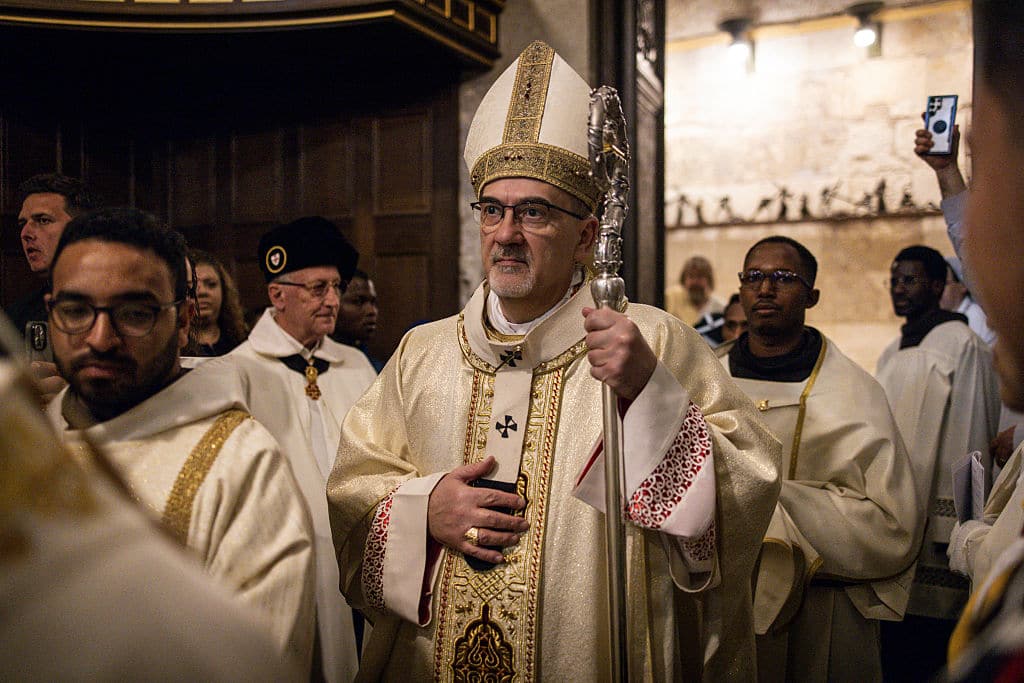When people think of the papacy, they often envisage St Peter’s Basilica, the vast halls of the Vatican and centuries of European dominance in the Church’s highest office. Few, however, remember that the papacy did not begin in Rome – it began in Palestine.
The first Pope, St Peter, was a Palestinian Jew: a fisherman from Galilee who answered Christ’s call. His faith was shaped by the land where Jesus walked, where the Beatitudes were first spoken and where the Church itself took root. Yet today, as Christianity struggles to survive in its birthplace, the absence of a modern Palestinian or Middle Eastern Pope raises a question, rarely asked. Could it ever happen again? And if it did, and there was another Palestinian pope, what would it mean?
For centuries the papacy was almost exclusively European, distancing itself from the region where it all began. But history tells a different story – one that has been largely forgotten. At least two other popes, Evaristus and Theodore I, hailed from Palestine. Both led the Church through times of great turmoil.
St Evaristus, who was pope from AD 99 to 107, is traditionally believed to have been born in Bethlehem. He led the early Church during Roman persecution, providing spiritual guidance to Christians facing immense challenges. St Theodore, who reigned from AD 642 to 649, was born in Jerusalem. He defended the orthodox understanding of Christ’s dual nature against the Monothelite heresy, excommunicating those who promoted it.
By then Islamic conquests had already reshaped the Middle East; Jerusalem had been under Muslim rule since AD 638. Evaristus and Theodore were not just spiritual leaders; they were survivors shepherding a Church that was fragile, persecuted and deeply connected to its Palestinian and Eastern roots.
Today, Palestinian Christians, the direct heirs of this legacy, are barely visible on the world stage. Their numbers are shrinking, their voices drowned out, and their historical role in the Church is often ignored – or worse, deliberately silenced. I still remember the words of my aunt, spoken with quiet sorrow: "We are the people of the land where Christ was born, but it feels as if the Church has abandoned us. Do they not feel our suffering and pain? Do they not see the apartheid wall that cuts Bethlehem from Jerusalem? Do they not hear our prayers?"
Her words have stayed with me. While the Church calls itself universal, its leadership rarely reflects the land where its faith began. Gestures, while important, are not enough. Electing a pope from Palestine or the wider Middle East would be a historic correction – a declaration that Christianity is not merely a Western religion but one deeply rooted in its place of origin.
The idea of a modern Palestinian or Arab Pope might seem unlikely. The Vatican has long been shaped by European leadership, and there is only one cardinal of Palestinian descent – Fernando Natalio Chomalí Garib, the Archbishop of Santiago. But history has a way of surprising us. The Church has already broken traditions, choosing popes from Poland, Germany and Argentina. So why not from the land where Christ was born? Why not from the people who have safeguarded the faith through centuries of trials? Sometimes, the most unexpected choice is the one that speaks the deepest truth.
Figures like Cardinal Louis Raphael Sako of Iraq, Cardinal Béchara Boutros al-Rahi of Lebanon, or even Cardinal Pierbattista Pizzaballa, the Latin Patriarch of Jerusalem, represent a Church still deeply tied to its Eastern heritage. Though Pizzaballa is Italian by birth, he has dedicated his life to the Christians of Palestine – living among them, understanding their pain and struggles, and advocating for their aspirations. Could the Church look toward its own cradle for leadership?
A young Palestinian seminarian once told me: "We remain faithful, trusting in the Lord’s promise that the gates of hell shall not prevail against His Church. We endure, carrying our crosses as Christ carried His. But sometimes, we wonder – does the universal Church remember us, her children in the land where salvation history unfolded? Or have we become mere relics of the past, or worse, stones in ancient churches that pilgrims visit to renew their faith, while our living faith goes unseen?"
His words echo a painful truth. Palestinian and Middle Eastern Christians exist, but they are often treated as spectators in their own history. The election of a pope from Palestine or the Middle East would be more than symbolic. It would be a powerful statement from the Church, reconnecting with its roots and acknowledging the struggles of Christians in the Holy Land.
As Christianity in Palestine faces existential, systematic threats, the question is no longer whether such a pope is possible, but whether the Church is brave enough to return to its origins. Would it remain a historical footnote, or could it mark the beginning of a new era for the global Church?
The answer lies not only in the hands of the cardinals who elect the pope, but in the hearts of all who believe the Church must remain true to where it first began.
<a href="https://thecatholicherald.com/papabile-of-the-day-cardinal-pierbattista-pizzaballa-the-bridge-builder-from-jerusalem/"><strong><em><mark style="background-color:rgba(0, 0, 0, 0)" class="has-inline-color has-vivid-cyan-blue-color">RELATED: Papabile of the day: Cardinal Pierbattista Pizzaballa – the bridge-builder from Jerusalem</mark></em></strong></a>
<em>Photo: Cardinal Pierbattista Pizzaballa, Latin Patriarch of Jerusalem, attends a memorial Mass for Pope Francis at the Church of the Holy Sepulchre in Jerusalem, 23 April 2025. (Photo by JOHN WESSELS/AFP via Getty Images.)</em>



